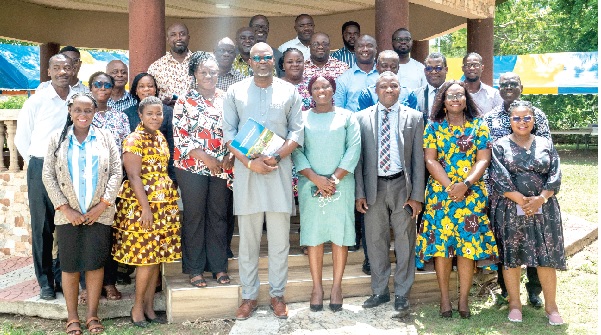
CSIR’s waste-to-energy policy guidelines reach final phase
THE Council for Scientific and Industrial Research (CSIR) has presented its hybrid waste-to-energy policy guidelines for feedback from experts and stakeholders for finalisation of the document.
Advertisement
In line with this, the council organised a stakeholders’ meeting to enhance awareness of the draft policy to guide waste-to-energy (W2E) initiatives in the country.
It will also deepen stakeholder engagement and partnership for the next level of the implementation of the guidelines.
The CSIR-Science and Technology Policy Research Institute (CSIR-STEPRI) undertook the project with sponsorship from the Federal Ministry of Education and Research of Germany (BMBF) through the West African Science Service Centre on Climate Change and Adapted Land Use (WASCAL).
The project which began four years ago has gone through various phases, including baseline studies, community engagement, stakeholder consultations, education and research.
Some of the highlights discussed at the meeting included hybrid waste to energy (W2E) as a sustainable solution for Ghana; overview of waste-to-energy implementation and purpose; conversion of waste into renewable energy and status of the waste-to-energy project.
Gyankobaa project
The Director-General of CSIR, Prof. Paul Bosu, said the preparation of the guidelines formed part of the construction of a 400 KW hybrid waste-to-energy project at Gyankobaa in the Atwima Nwabiagya Municipal Assembly in the Ashanti Region.

He said the project treated municipal solid waste through segregation and the conversion of various fractions into energy by using biogas, pyrolysis and solar PV plants.
“CSIR is so proud to be associated with this novel energy project which converts municipal waste into renewable energy through three different technologies.”
“The guidelines will assist policymakers and stakeholders to assess opportunities, limits and risks of waste-to-energy technology for effective planning and efficient investment in waste management,” Prof. Bosu added.
He expressed appreciation to the German government and WASCAL for funding the feasibility studies.
Integration
The Director of CSIR-STEPRI, Dr Wilhelmina Quaye, also said the W2E guidelines would be integrated into the national policy on sanitation and waste treatment to trigger an action plan on waste valorisation in the country.

“In Ghana, about 50 per cent of the waste generated are collected and dumped in landfill sites leading to poor sanitation, diseases and greenhouse gas emissions, among others. From the inception of this project, we envisioned a future where waste ceased to be a burden but instead became a catalyst for progress," she said.
"Turning waste materials into a source of power that lights up our lives."
“The touch we pass today carries the flame of responsibility. We need resources to make the waste-to-energy guidelines a legal document as we continue to innovate, educate and advocate for sustainable waste-to-energy practices,” she added.
Support
For his part, the Executive Director of WASCAL, Prof. Emmanuel Wendsongre Ramde, said his outfit would continue to support the project to ensure its successful completion.
“I am immensely proud of the progress we have made so far. Our work, however, is far from over. Today’s meeting serves as a platform for reflection, celebration and planning for the future,” he said.
“We endeavor to entrench our partnerships to support the policy’s implementation, enabling the replication and scaling up of similar projects across the country and beyond,” Prof. Ramde added.
The over five hour stakeholders dialogue brought together representatives from various institutions, including Edward H Decker, a representative from CSIR Head Office, Ing Solomon Nii Noi of Accra Metropolitan Assembly, Mr Fred Appiah from Energy Commission, Ing Israel Acheampong (Zoomlion Ghana), Mr Lovelace Sarpong (Environmental Protection Agency), Dr Mutala Mohammed (CSIR-IIR), Ing Seth Manu (Ministry of Energy), Dr Roland Asare and Dr Portia Adade Williams, both of the CSIR.





